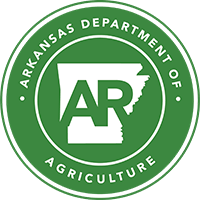Livestock & Poultry
Safeguarding human and animal health, assuring food safety and quality, and promoting Arkansas livestock and poultry industries for the benefit of our citizens
Agriculture / Livestock & Poultry / Vesicular Stomatitis Update 08/10/2023- Status until this Notice is Replaced
Vesicular Stomatitis Update 08/10/2023- Status until this Notice is Replaced
Changes to this notification are made as needed to reflect any continuing threat from the vesicular stomatitis virus (VSV) in neighboring states and findings of VSV on Arkansas premises. The Arkansas Livestock and Poultry Division is monitoring all potentially affected species through the efforts of livestock inspectors stationed and present at all livestock auction barns selling cattle, swine, sheep, and goats. Livestock inspectors are also present for observation and documentation checks at horse auctions and equine events within Arkansas.
On May 17, 2023, the National Veterinary Services Laboratory in Ames, Iowa, confirmed the index case of VSV in San Diego County, California. The following week, additional cases were confirmed in Riverside County, California. During the week of June 16, 2023, the index case for Texas was confirmed in Maverick County.
The last outbreak of VSV occurred from April through October 2020, with a total of 326 premises affected in 8 states (Arizona, Arkansas, Kansas, Missouri, Nebraska, New Mexico, Oklahoma, and Texas).
Currently, there are confirmed cases of VSV in California, Nevada, and Texas. Special entry requirements are needed at this time. Please check this site often for any changes in status for the situation.
ANY EQUINE (horses, mules, donkeys, miniatures, etc.) MOVED FROM A VSV AFFECTED COUNTY (county has any quarantined premises) or FROM ANY COUNTY NEXT TO AN AFFECTED COUNTY (also called an adjacent county) to travel within the borders of Arkansas, attend an event in Arkansas, or be relocated to Arkansas must be accompanied by a certificate of veterinary inspection (CVI) dated within 5 days of movement from origin premises that:
- Is signed by a state licensed and category 2 - USDA accredited veterinarian from the state of origin
- Includes the animal’s rectal temperature
- Includes EIA ”Coggins” test results noted with laboratory document verification numbers
- Includes an Arkansas entry permit number
- Includes the following VSV statement: “All animals individually identified and noted on this Certificate of Veterinary Inspection have been examined by me and found to be free from signs or lesions of vesicular stomatitis virus infection. The owner of the animals listed has attested to me that these animals have not had direct contact or indirect exposure to any premise quarantined or suspect for presence of vesicular stomatitis within the past 30 days.”
Other information about VSV movement restrictions and other information sources can be found: https://www.aphis.usda.gov/aphis/ourfocus/animalhealth/animal-disease-information/cattle-disease-information/vesicular-stomatitis-info
FAQ - Vesicular Stomatitis Virus
A link to the online - 24 hour/7 days a week - automated Arkansas Entry Permit Number assignment: https://appengine.egov.com/apps/ar/AAD/EntryPermit.

